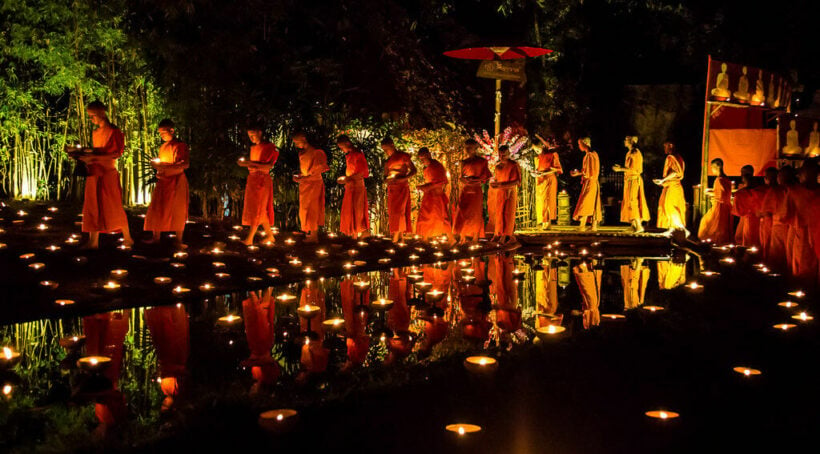Makha Bucha Day 2022: All about the public holiday in Thailand

For Thai Buddhists, Makha Bucha, also written Māgha Pūjā, is a day of abstinence, reflection and visits to the local temple, which culminate in picturesque candle-lit ceremonies in the evening. For those who don’t follow the Buddhist traditions, it’s a day of no alcohol sales.
In fact, there is always a 24 hour alcohol ban imposed on the day, from midnight to midnight. Although it tends to cause a stir among thirsty expat circles, that’s not what the holiday is all about.
The second most important Buddhist holiday is celebrated on the full moon day of the third lunar month, according to the Buddhist calendar, in Thailand, Laos, Cambodia and Sri Lanka. It commemorates the day 1,250 disciples spontaneously gathered in the bamboo grove to hear Buddha teach. The meeting is also revered as the formation of an ideal and exemplary monastic community.
Buddhist commemorations make up a number of the public holidays on the Thai calendar, among them is Makha Bucha Day. The Buddhist calendar traditionally uses dates based on the movement of the moon, and the third lunar month is known in Thai as ‘makha.’
The term ‘makha’ comes from the word ‘Magha’ in Pali, the sacred language of the religious texts of Theravada Buddhism, the branch most widely practised in Thailand. ‘Bucha’ is a Thai word – once again deriving from the Pali language – meaning ‘to venerate’ or ‘to honour.’
On this day, Thais will make merit at their local temples, where they will give alms to monks and maybe even recite Buddhist scriptures. In the evening, monks and devout Buddhists will participate in commemorative candlelight precessions.
Alcohol and drugs are just a few things Buddhists avoid on Makha Bucha Day. The restricted behaviours including gambling, lying and gossiping, harming other living things and eating meat, sexual promiscuity and stealing. Even Buddhists who are less devout might avoid eating meat and drinking alcohol on this day.
It first came to be celebrated in modern-day Thailand during the reign of King Rama IV, initially observed only in the grounds of the royal palace and later becoming more widely recognised nationally and finally introduced as a Thai public holiday. The Thai government has imposed an alcohol ban since 2015.
But the origins of Makha Bucha Day itself lies much further back, 45 years before the beginning of the Buddhist era and nine months after the Buddha is said to have achieved enlightenment. Then, on the full moon day of the third lunar month, it is believed that a meeting between the Buddha and his disciplines became a momentous and historic occasion.
Including the fact that it already fell on the auspicious occasion of a full moon, the meeting is said to have taken on four remarkable characteristics that are still recounted in Buddhist teaching today:
- 1,2500 disciples came to Buddha spontaneously
- They were all enlightened disciples
- They had each been directly ordained by Buddha
- It was the full moon day of the third lunar month
These four elements have also given Makha Bucha Day the nickname of “Fourfold Assembly Day.”
The holiday is also said to influence the Chinese Lantern Festival, celebrated on the 15th day of the first lunar month at the end of the Lunar New Year, according to the Chinese lunar calendar — which this year falls on February 15, when the moon first appears to be full in the sky to the naked eye.
Similar to the candle-lit precessions of Makha Bucha, those who celebrate the Lantern Festival will light candles in paper lanterns and release them into the sky.
Although Thailand has no official state religion, Theravada Buddhism is by far the most popular faith observed by the majority of the Thai population, and so significant Buddhist occasions like Makha Bucha loom heavy on the Thai consciousness and figure prominently on the country’s calendar.
Since 2006, the government has branded the holiday as a “national day of gratitude” — or a spiritual alternative to the secular faux festival Valentine’s Day.
Latest Thailand News
Follow The Thaiger on Google News:


























